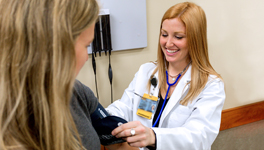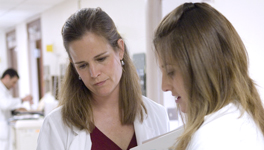
10/20/2015
Denise Fields
Denise’s Story
Denise Fields, Pharm.D., received her Bachelor of Science degree in Pharmacy from Butler University in 1992. She was a member of the second class at Butler to be offered the option to obtain a Doctor of Pharmacy degree. Dr. Fields did not choose to stay the extra year. She left hospital pharmacy about one year after graduation due to a move to southeastern Indiana. Once a hospital job opened up five years later, she decided to take Doctor of Pharmacy degree classes to refresh her pharmacokinetic and therapeutic knowledge and skills. Dr. Fields ended up completing the non-traditional Doctor of Pharmacy program, graduating in May 2003 from Purdue. Dr. Fields has many years of practical experience, and has continued to enhance her knowledge and skills through certification programs. Dr. Fields currently holds certifications in anticoagulation, diabetes care, immunization, medication therapy management (MTM), and pharmacogenomics.
Dr. Fields is President for the ASHP state affiliate, the Indiana Society of Health-System Pharmacists (ISHP). She is also the Vice Chair for the SAG on Small and Rural Hospitals. Dr. Fields is a member of the advisory group for the ASHP Center on Pharmacy Practice Advancement. She was also a delegate to the ASHP House of Delegates this summer (2015) in Denver.
Facility
In her previous role at Decatur County Memorial Hospital, Dr. Fields held the position of Director of Pharmacy for nearly 10 years. This was a critical access hospital allowed many opportunities to advance informatics, establish a medication safety committee, implement an electronic health record and a 340B program, lead meaningful use efforts (including being the lead project manager for CPOE), develop and manage an Anticoagulation Clinic run by pharmacists, grow the Diabetes Care program to include pharmacists, implement discharge counseling, and develop a Travel Health program. Dr. Fields made sure to not just advance her own skills, but all the pharmacists earned certificates in anticoagulation, diabetes and immunization therapy. She took the facility from one with no automated dispensing to more than 90% of doses coming from automated dispensing cabinets. They were early adopters of bedside barcode scanning in 2005, particularly for a critical access hospital.
Dr. Fields was not looking to leave her role, but was pursued (because of her experience and certifications) to take a role in managed care. A large self-insured manufacturing employer wanted to have a pharmacist on-site to do MTM and serve in the primary care clinic they were building. Realizing that the profession needed to continue to advance in ambulatory care services, Dr. Fields took the biggest career leap of her life, and left health system pharmacy after nearly 20 years.
Although she no longer works in a health system, Dr. Fields continues to mentor her predecessor and other rural pharmacists in Indiana through her board position on the Indiana Rural Health Association. Small and rural hospital will always be where her heart lies, but Dr. Fields is blessed to be able to partner with some of the local health systems now on health and wellness projects for the self-insured employer she serves.
Dr. Fields currently does MTM and health and wellness education for Cummins (the self-insured employer she serves) in southeastern Indiana. There are approximately 40,000 lives served in this population. Currently, she can see patients in the occupational health clinic, or travel to their work location (whether that is an employee in an office or one in a factory). Once the clinic opens in 2016, Dr. Fields will be working in the clinic bullpen with the physicians, and the MTM services will be advanced with the addition of a collaborative practice agreement.
Significant Projects
The most significant project Dr. Fields has been involved with this past year has been the facilitation of an eight-week lifestyle education program for the employees at Cummins. She was asked to partner with the wellness program manager at Cummins on this project. They started with two pilot projects in 2014 — one at Cummins and one at the local hospital (Columbus Regional Hospital). To date, they have had over 200 employees at Cummins go through this program.
The program is called CHIP (Complete Health Improvement Program), and is licensed through Lifestyle Medicine Institute (LMI). It includes participants in the corporate setting and 18 one-hour sessions about the importance of lifestyle choices, and the impact on health and wellness. Topics include diet, exercise, hydration, sleep hygiene, stress management, goal setting, forgiveness, gratefulness, and sustainability. The participants are invited to engage in monthly support group meetings after the eight-week program ends. The results have been amazing. Dr. Fields saw total cholesterol drop by 20% on average in six weeks, and one individual to had a triglyceride level decrease of over 80% in just eight weeks. Employees are being given hope that they can impact their own health and well-being, and it has spread by word of mouth. They haven't done an information session to recruit volunteers since November 2014 — they have had so many folks seeking them out because of what they have heard from their co-workers that there is waiting list into 2016.
Besides facilitating the program, Dr. Fields participates in the biometric screenings by doing a medication and biometric results review with each participant before they start the program. She also sends letters to their physicians to let them know that they are going to be making some lifestyle changes, so their providers know to monitor them more closely during this time. Dr. Fields find it so exciting to be able to show patients that pharmacists don’t just want to fill prescriptions or see them started on yet another medicine. There are so many people surprised to find that a pharmacist is working with them to help empower them to be able to get off of their medications (or not even start them) through lifestyle change.
Every provider that will work in the Cummins Live Well primary care clinic will have to be lifestyle certified — Dr. Fields truly feels like she is involved with a cutting edge concept that will transform how health care is delivered.
Advice for Someone New to Your Specialty Area
“Become a life-long learner. Look for non-traditional areas where pharmacists can make an impact and can demonstrate the value we bring to the table. Don’t rule out any settings.”
“It was truly a blessing to be placed in the occupational health clinic while waiting for the primary care clinic is being built, as I have been able to demonstrate the value of a pharmacist in that setting. In fact, the occupational health team will be pursuing funding for a pharmacist position once I transition to the primary care clinic.”
“Also, you must become an advocate for public policy and pharmacy-specific interests. If you want to see advanced roles continue be a possibility, then you must work to help local, state and federal law be changed to allow for pharmacists to work at the top of their license.”
“Lastly, you have to get involved with other organizations outside of pharmacy to ensure we have a voice at the table. I am a board member for the Indiana Rural Health Association. I am also a National Association of Drug Diversion Investigators (NADDI) member, and I serve on the Indiana Attorney General’s Prescription Drug Abuse Task Force.”
ASHP’s Value to Members
“I continue to encourage students and colleagues to join ASHP. I highlight the tools, the education, the support and the networking as reasons to join. I no longer have an employer paying for this membership, but explain that I personally see the value it provides for my career and skill development, so I continue to invest (financially and through my time).”
“Over the past year, I have given new reasons — especially to my students. If we want to really advance our profession to provider status (The Pharmacy and Medically Underserved Areas Enhancement Act (H.R.592/S.314), then we must invest in ASHP so that ASHP can advocate on our behalf. Invest in your career through an investment in ASHP.”
“Most importantly, today it is for the advocacy of provider status. We need to have a combined and strong voice for many pharmacy-centric issues.”
“ASHP provides ideas through networking and education and solutions through on-line tools and other print resources.”

Inpatient Care Practitioner


